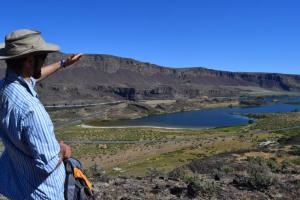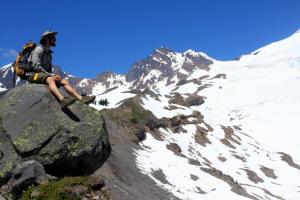Hal Wershow
Hal Wershow
Geoscience Associate Faculty member
I became a geologist because I wanted to have my cake and eat it, too. I loved deep intellectual engagement, but I balked at the idea of spending my life in front of a computer, reading, thinking and writing. In the process of fulfilling my college science requirement, I discovered geology field trips. We explored the San Andreas Fault, Death Valley, Mono Lake, Inyo Crater, and countless other locales throughout California and the Southwest. Sweaty, dirty and sunburnt became a normal part of my academic life. My engagement with the landscape evolved, as “beautiful mountains” became dynamic blocks of rock that were rising upwards even as they came tumbling down. I came to realize that “geologizing” allowed my intertwined spirituality, curiosity and physicality to become fully expressed.
As a teacher, I have come back to “geologizing” in the field as a unique way for students to develop their critical scientific thinking. The first lesson in the field is to become good observers. The Earth offers us so many clues, from trees growing at funny angles on unstable slopes to oddly linear piles of boulders and debris (“glacial till”). But it does not give us the answer key. Instead, we must present plausible hypotheses to explain the bizarre phenomena we are witnessing. If the linear pile of debris was really deposited by a glacier, then there should be other signs of glaciation in the area. And we must be prepared to reject our hypotheses as we observe more evidence. Every round of observing, interpreting and hypothesizing is followed by a re-evaluation, forcing us to stay open-minded and critical.
But field experiences go beyond effectively teaching critical scientific thinking. They also allow for bonding. Having fun together is a great way to build bonds of friendship. Suffering together, from mosquitos and hailstorms and vans getting stuck in the mud (to name a few), builds relationships that will outlast the class. Studies have demonstrated that meaningful relationships are among the best predictors of retention and persistence. In a community college setting, I believe this side-effect of field learning may be more important than the actual course content. Our students will be able to draw on these relationships in both their personal and academic lives, as I have done in mine.



